There have been two MCU team-ups so far: Avengers and Guardians of the Galaxy. We’re still up for more Guardians, but Avengers are over and done with, and so it seems like an appropriate time to look at what that team-up gave us with a focus on what’s in the name: team, and team dynamics.
The Guardians might still evolve, but their two films can serve as a useful comparison, especially as there are two of these films so far and there are two true Avengers team-up – Endgame and Infinity War not being so much about the original six working together. So without further ado, let’s look at what went happened with Earth’s Mightiest Heroes.
The beginnings
In both cases – Guardians and Avengers – we start with people who not only have nothing in common but are antagonistic towards each other. In Guardians, this is more obvious, as they get together by physically fighting in public and being sent to prison for it. The conflict within the nascent Avengers is a bit less all-out, but still very much there. Natasha meets both Tony and Bruce by manipulating them and lying to them. With Tony, it’s a bit more serious and presumably would have more long-term effects. She even explicitly says, at the beginning of the film, that ‘Stark only trusts me as far as he can throw me’.
Steve – presumably because he was given her unfavourable report, so there is another manipulation right there (of Tony, too, since he was shown that report and it would have coloured his approach to both Natasha and the Avengers) – starts out with disliking Tony strongly and making no secret of it, while Tony makes insensitive jabs at his 70 years in the ice. Apart from Natasha, they all meet Hawkeye while he is under Loki’s control and so working against them. Thor gets into a physical altercation with both Steve and Tony when he arrives, an altercation which would have killed them if they weren’t enhanced. It all culminates on the heli-carrier, where Loki’s sceptre makes them lay into each other – sometimes with pretty outrageous claims, that goes especially for Steve towards Tony – and then the Hulk is released and endangers all of the rest of the group.
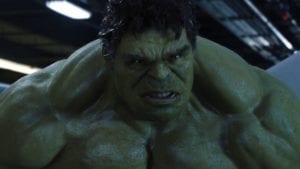
Now, none of these issues are ever truly addressed at any point later in the film(s). Tony doesn’t trust Natasha, and Bruce feels manipulated. You’d think that’d be an issue to deal with later, to have a functioning team. You don’t want these kinds of things to fester. There’s nothing truly comparable in the Guardians, but Gamora being the daughter of Thanos and the others not trusting her for it is likely the closest we can get, and it is addressed repeatedly and dealt with explicitly.
Not so with Nat. In fact, Age of Ultron Nat goes right back to manipulating Bruce, effectively showing the matter was never truly resolved. The same argument could be made for Tony and the Civil War, given her line about ‘ego’. The only one who gets to deal with Natasha’s manipulation of him in later films is Steve in Winter Soldier, even though he was the one least harmed by her working methods in Avengers.
With Hawkeye, too, there is nothing indicating the team accepting his brainwash by Loki. I don’t think they’re assholes enough to blame him for it, mind you, but one would expect there’d be some initial issues with working with him in the field before they got used to him. There was nothing, though. But alright, they never actually fought him when he was under the sceptre’s control, so let’s just say they don’t have any issues. This, at least, I can imagine.
Steve and Tony is another thing that never gets addressed anywhere until it massively explodes in Civil War. Steve’s issues seem to stem from the unfavourable report on Tony he got from SHIELD, since he’s antagonistic from the very start. Tony’s stem from his father being obsessed with Captain America over his own son. Plus there’s the personality clash, of course. All the things you’d expect would get some attention later. Steve’s issues do – he’s explicitly proven wrong by Tony at the end of the film. But that’s it. That’s all we get. Tony has one line about his dad and Steve uttered to Bruce, and the next time it’s brought up, they’re beating each other up in Siberia. Great job on the teamwork there!
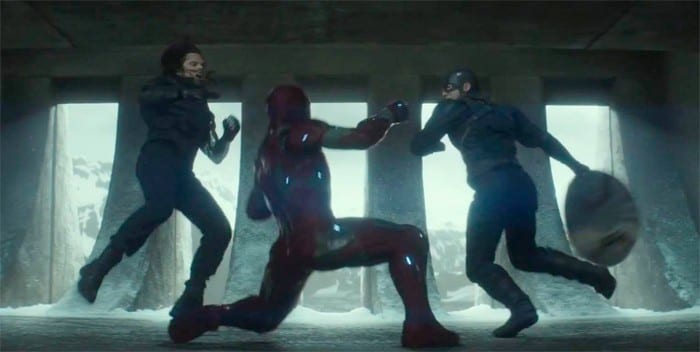
Thor’s initial attack on the Avengers is dealt with Toy’s line “no hard feelings, Point Break, you got a mean swing”, and that’s it. It makes sense in-universe because Thor is an important, valuable ally, but it’s another thing that isn’t dealt with and, in fact, sort of echoed when Thor physically attacks Tony in Age of Ultron.
The last one here is Bruce, and the team’s fear of his is likewise never truly dealt with. It’s ever-present, manifest particularly in Natasha and her very careful approach towards the Hulk, even as she manipulates Bruce. Bruce’s possible lack of security after his initial manipulation is never taken into account, and once again blossoms into a fully fledged issue at the end of Ultron, where he leaves after being manipulated once more.
Many of the issues here are insidious and would be much harder to address that the Guardians’ straightforward physical conflict, but that doesn’t mean no attempt should have been made.
Getting the team together
After the initial conflict, we need motivation for the teams to come together. In the case of the Guardians, it’s getting out of prison and getting rich on selling the Orb. It’s a pragmatic motivation that gets them to actually cooperate. Because their issues, apart from Drax’s with Gamora, were relatively superficial, this was an effective tool for making this work to a degree. Note that it is exactly Drax’s deeper issue what makes it explode later on.
With the Avengers, this motivation is Coulson’s death and Fury’s manipulation of it. It’s…an interesting choice. Even assuming we accept that the incoming Chitauri army was not motivation enough, which is one big assumption, who was Coulson even supposed to work on? Steve, maybe, but Steve of all people is the one who would be most likely to go save the world no matter what. Isn’t that what he does? You aren’t going to convince me Steve needed extra motivation to fight Loki. Maybe to work with SHIELD and Tony on it, but Coulson’s death hardly works with the second, and as for SHIELD, since Steve later comes to outright work for them, I don’t think his issues about Phase 2 were particularly big.
Neither Thor nor Bruce were there for the manipulation, and it wouldn’t have worked on them anyway. Bruce didn’t know Coulson, and while Thor did, his main motivation was always going to be Loki, and anything more is patently unnecessary.
Natasha and Clint are both professionals, so they were unlikely to need additional motivation if SHIELD sent them to New York. Additionally, we never see them react to the news. The ones we do see react are Tony and Steve, so it indicates it was directed at them, perhaps because they were the two having the biggest issues with SHIELD making Tesseract weapons.
I’ve already gone over my doubts about the manipulation being necessary for Steve at all, so let’s look at Tony, the presumed main target since he has always been manipulated and treated like a child by SHIELD.
Tony knew Coulson, and their initial scene in Avengers is probably meant to imply they liked each other. But the thing is…the previous time we saw them together, in Iron Man 2, Coulson imprisoned Tony in his own house and threatened to tase him, and he didn’t exactly show respect at the beginning of The Avengers either, what with breaking into Tony’s house. It’s true that Tony’s been strangely sanguine about all of these things. There is a major discrepancy here between what we see and the characters say. But even if we accept what they say and pretend Tony and Coulson were sort of distantly cordial – or hell, that Tony was upset over his death for Popper’s sake, since she as friendly with Coulson, entirely possible – it’s still very dubious it would be more of a motivation that all the other people Loki killed and the army Thor mentioned he means to bring in.
So, in short, we have an elaborate manipulation by Fury to bring the Avengers together which is of dubious value and is, you know, manipulative. Again. Adding another rotten plank to the foundations of this house.

But all right. Let’s pretend it works, and the team sets out to New York based on Fury’s manipulation. Then they fight together and the battle ends when Tony almost sacrifices himself and is saved by the Hulk.
The end.
Now, notice how the Guardians have a few more steps to it. They break out of the prison – the fight they brought themselves together for – and then, after arriving at Knowhere, they fall apart, because of the aforementioned Drax’s deep issues.
The shallow motivation they had for working together was enough to hold them together for that one escape, and that was it. To get further, they have to go deeper. They have to make a conscious choice to come back together, to risk their lives to save each other and Xandar, and implicitly the galaxy. Fittingly, the saving itself ends up being a team effort, where they all save Quill by, again, choosing to risk their life by taking his hand. The successful team bond literally could not be better, or more obviously, manifested.
The Avengers have nothing in the slightest like this. There is nothing deeper, there is just getting together for that one fight. Tony almost sacrifices his life to narratively prove Steve wrong, being the only one who needs to do so – no one else’s accusations on the helli-carrier were taken this seriously, and Steve’s were the most absurd. There’s no coordinated effort to save Tony when he flies to his death. Hulk saves him, yes, as a result of Tony bonding with Bruce. That’s an individual friendship. But team action? No.
Where the ending of the Guardians was a team play, the Avengers end on a very individual note, and fittingly, while we see the Guardians all flying away from Xandar together, we see the Avengers each going their separate way, only Tony and Bruce hanging out together, because they were the only two who showed signs of actual deeper bonding.
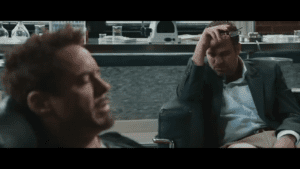
We know Bruce and Tony are friends, we know Clint and Natasha have been friends for a while, and we get Natasha bonding with Steve later, in Winter Soldier. But that’s it, these are the personal bonds at the end of The Avengers. There’s really no team.
The conflict
Already, the Guardians stand on much firmer ground than the Avengers ever did. Not just because we saw a much more thorough “team building” from them, but also because they ended together and stayed together. The Avengers left separately, and we saw, in later solo films, evidence that they were not only not together, but they also seemed to not be in contact at all. Tony never contacted any of his Avenger colleagues over the trouble with Killian in Iron Man 3, and we only see him talking to Bruce at the end, no one else, confirming this is the only firm relationship in the Avengers Tony has. Steve and Natasha never contacted Tony (or anyone else for that matter, but he would have been the obvious choice) when they found out HYDRA had infiltrated SHIELD. Thor never contacted any of the Avengers during the Convergence, even though, once more, it seems like an obvious thing to do. The Avengers got together for that one fight, they won that fight, they ate shawarma together, and that was it.
And then we come to The Age of Ultron. The opening scene has the Avengers fighting together again, and the implication is this has been going on ever since the fall of SHIELD. So presumably Thor noticed what was going on on the news, or perhaps Jane told him, and he remembered SHIELD had Loki’s sceptre, and decided he needed to get it back pronto. And this time, he did call the Avengers for help, probably because he didn’t have the first idea where to start looking.
So when we do the math, the implication is that they’ve been together for over a year, working through HYDRA bases and looking for the sceptre. But we don’t actually see any of that. We see the end result, which is the good battle coordination and easy camaraderie displayed at the beginning of the film, but none of that lasts long. But more on that later.
What matters, in this context, is that technically the Avengers have been together much longer, at this point, than the Guardians in Guardians of the Galaxy vol. 2, since that film is supposed to take place just a few months after the first installment. But when it comes to what we’ve actually seen on our screens, the Guardians have a much better and firmer bond.
In both cases, the second film deals with the same theme: internal conflict in an established team, and a villain that’s closely tied to one of them. Even fatherhood in a way, really. The differences in how they deal with it, however, are profound, and very telling.
Of course, the Guardians already have experience with one of their own messing up big time. That was Drax in the first film. His stupid, violent instinct – which was a result of his trauma – almost got all of them killed. They were angry for a while, but Drax chose to atone for his mistake and that was it, everyone forgave him.
Rocket, in contrast, messed up for no good reason at all, after they’d spent much longer together and so he should feel at least some responsibility towards the others. And yes, the others are angry with him and they argue. Bur Rocket comes to save them and fight Quill’s personal villain, and in the end, they are together once more, accepting new people into the fold, growing, learning from their mistakes.

The Avengers go very differently.
As I have said, what we have actually seen is Bruce and Tony being colleagues (though not truly close friends, given the after-credits scene), Steve and Natasha being friends, and Clint and Natasha having a close bond. Then we see the Avengers functioning together as a team in the field at the beginning of Age of Ultron. Afterwards, there are some friendly moments on the quinjet and in Avengers tower, and then there is the party, where everyone has fun with Thor’s hammer.
Here I have to make a choice on how detailed I want to get. I could analyse the different interactions between the Avengers, focus, for example, on how telling it is that after a year of working together, Thor still has zero idea about Bruce’s sensibilities and what to say to make him feel better about the Hulk. But it would be an extremely Watsonian approach to take since most of the issues here are very likely simply clumsy writing. For our purpose, it is enough to say that all of the post-battle scenes were meant to show a friendly atmosphere and established team dynamics.
What follows, however, belies this implication much more strongly than a few insensitive remarks.
Wanda triggered a deeply traumatic nightmare for Tony, a PTSD sufferer, though the team doesn’t know about that. As a result of this, Tony tried to analyse a dangerous object, with the team’s knowledge and agreement and tried to find a way to use it to create a program to save the world, without the knowledge of anyone but Bruce. He keeps this secret primarily because he knows discussions would take time, and Thor only gave him a few days with the sceptre.
Now the degree to which Ultron’s birth was an actual result of the second attempt is debatable. We see a schematic that says the sceptre’s integration was successful on test 75, but then JARVIS claims the integration efforts were unsuccessful, so which is it? In any case, there was no interface to Ultron yet, so there were at least some precautions taken for any unexpected results. But of course, Tony and Bruce underestimated the Mind Stone.
Even if this was the scenario most unfavourable to Tony and Ultron was born as a direct result of his attempt to create a protection for the world, we still have a situation where a PTSD sufferer, who has been brutally triggered, responds by trying to save the world by means that were not team-approved, because he is under very real-time constraints and fears this is his only chance.
Compare it to Drax, who endangered the galaxy for personal revenge, and Rocket, who endangered his team/family for personal gain. Tony comes out of it looking quite well.
And yet, while the Guardians forgive both Drax and Rocket easily and stay together, that is not what happens with Tony.
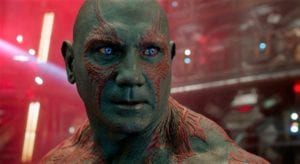
After the first fight with Ultron is done, the Avengers argue. It begins with Tony announcing JARVIS, his faithful AI companion and butler, was murdered by Ultron. In a fit of rage, as Bruce says. Directly following that, Thor comes in to grab Tony by the throat and lift him into the air. No one even blinks, let alone utters some kind of reprimand. In the Avengers interactions that follow, we see some low-key hostility towards Tony, which climbs up to a higher key when Steve is displaying his anger towards Tony in a manner just a bit more restrained than Thor. He doesn’t almost shatter his throat, he completely shatters a log by way of a physical threat.
The point is, this is never actually resolved. The team gets together for a fight because they need to, just like in Avengers 1, but there is no effort to make up for a mistake because no one feels guilty of anything in this scenario. Tony feels he was only doing what he had to, Thor feels his rage was entirely justified, and Steve feels he treated Tony with understandable frustration and suspicion afterward. A situation which is completely corrosive for the team. Unsurprisingly, it ends with the team falling apart.
Drax and Rocket, in contrast, were clearly in the wrong, admitted they were in the wrong and made up for it by going to save the rest of the team at a huge risk to themselves, thus creating a very different situation.
At this point, if the Avengers were to be saved, they needed a mediator. They got Vision instead, who, while certainly impressive, was unfortunately not any kind of doctor, and especially not that kind.
New Team Members
In Guardians 2 and Avengers 2 both, new members are added to the team. For the Guardians, it is Mantis, for the Avengers, it is Wand and Pietro. Both are also first encountered as allies to the enemy before they are converted to the side of the heroes.
But once more, the actual story is very different in the two cases.
Mantis was kidnapped by Ego when young and lived alone with him on his planet. She never actively helped him do harm, and she decides to help the heroes when she realizes that what Ego is doing is wrong. She never actively harmed the heroes, and so she joins with everyone’s approval.
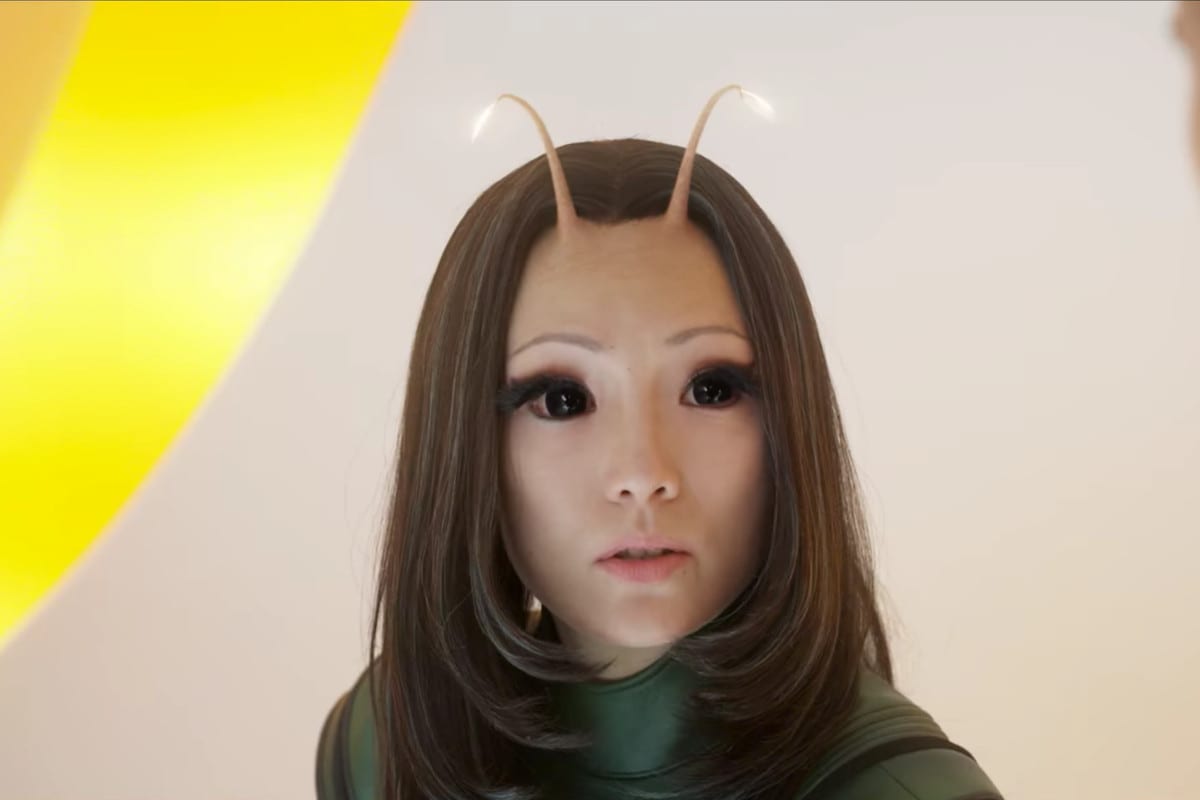
Wanda and Pietro, on the other hand, joined Ultron of their own free will and to reach their goal – destroying the Avengers – they were willing to kill uncountable innocents by unleashing the Hulk on Johannesburg. When they turn against Ultron, it’s because Wanda sees he wants to destroy the world, which inconveniently injures them. As the twins literally say in the film, what choice do they have but to turn on him, if they want to stay alive?
Steve brings them to the Avengers tower in spite of knowing perfectly well what Wanda’s attack did to Bruce in particular, and to a lesser degree to all of them. He also turns against Tony, to the degree that he is willing to attack him, essentially on the Maximoff’s word. Not that it’s entirely unjustified – Tony really did have no guarantees he would not create Ultron 2.0 instead of Vision – but doing so with the Maximoffs standing behind him, while confronting Bruce and Tony, who both have been harmed by Wanda, is effectively putting up one big middle finger to the team. He never consulted anyone on including the Maximoffs and bringing them to the Avengers’ home. This goes uncomfortably with the fact that it was previously explicitly stated that he was the least personally affected by her mental attack. He had no particular bad experience with her, so he let them come in.
Returning to the Guardians, it’s like if Ego said he no longer wanted to destroy the galaxy and Gamora decided it was good enough reason to take him on the team because he’s powerful and could be useful, without consulting Quill at all. What Wanda did to Bruce wasn’t some minor thing, it was completely dreadful, and should not just be ignored like this.

This is then capped off by Natasha betraying Bruce with a kiss, in a very Judas-like way. Her kicking him into a hole to wake the Hulk would always be deeply alarming behaviour from a romantic partner, but doing so right after she kisses him is just outright cruel. Bruce is manipulated and betrayed once again. No wonder that, when all is said and done, he leaves.
He’s not the only one. In fact, the only ones staying are Natasha and Steve, the two we have actually watched establish a friendship in The Winter Soldier. Sam comes in as Steve’s friend, Wanda and Vision have nowhere else to go, and Rhodey joins because…reasons, I suppose. And Tony leaves because…well. Either because after the terrible crime of creating Ultron, there was no place left for him there, or because he felt too uncomfortable sharing a team with someone whose approach was so different from him as Steve’s.
Age of Ultron made it extremely clear that the conflict between Tony and Steve from The Avengers has never actually been resolved, and that the Civil War was merely a natural culmination of that. Natasha’s tendency to manipulate people on her team was likewise never overcome in any constructive way. Bruce issues with the Hulk remained the whole time. And Thor has never started to take particular care with his teammates. There was hope some of these subjects would be touched upon in the last two Avengers films, but there was nothing related to Avengers team mechanics at all, except for that moment where Tony said he got tired of actively hating Steve after five years.
If there were any doubts before Infinity War and Endgame, this made it clear with finality. Whatever the implications of a year working together looking for the sceptre, the Avengers team has never properly existed.
The contrast with the Guardians could not be any clearer.
It would, in fact, be a brilliant display of team dysfunctionality as opposed to team functionality depicted in the Guardians, if only I could believe this was done on purpose. Unfortunately, I have my doubts.
But as a reverse honeypot, it works extremely well. The Avengers are a series of films about how you can’t build anything on rotten foundation. The Avengers got together in the midst of personal grudges and manipulations, and that was how they ended as well.

